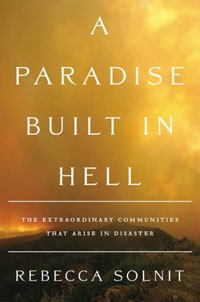Monument

Looking at Rebecca Solnit's body of published work--Hope in the Dark, River of Shadows: Eadweard Muybridge and the Technological Wild West, A Field Guide to Getting Lost, Wanderlust: A History of Walking, and As Eve Said to the Serpent: On Landscape, Gender, and Art--makes obvious her penchant for observation from oblique and tangential angles (her only obvious aspect). With her new opus, A Paradise Built in Hell: The Extraordinary Communities That Arise in Disaster (Viking), Lannan Literary Prize-winner Solnit takes on the aftermaths of disasters--including the 1906 San Francisco earthquake, the 1917 explosion that tore up Halifax, Nova Scotia, the 1985 Mexico City earthquake, Sept. 11, and Hurricane Katrina in New Orleans--and the communities that arise in response. Among other problems she cites is the misinformation frequently ladled out by first-responding media. Contrary to expectations, people respond altruistically, and Solnit notes, "The real question is not why this brief paradise of mutual aid and altruism appears but rather why it is ordinarily overwhelmed by another world order." Or to put it simply, panic seems to come from the top. For example, the misleading reports of lawlessness in New Orleans disregarded and discouraged the far more common acts of altruism. Pointedly, Solnit asserts that "no evidence exists that anyone was shot or killed by the supposed gangs." This is an eye-opening investigation by an original and diligent thinker: a kind of feel-good book for smart people. And we probably don't have enough of those.
Her recent essay on Sept. 11 at Tom's Dispatch concludes:
The dead must be remembered, but the living are the monument, the living who coexist in peace in ordinary times and who save one another in extraordinary times. Civil society triumphed that morning in full glory. Look at it: remember that this is who we were and can be.
